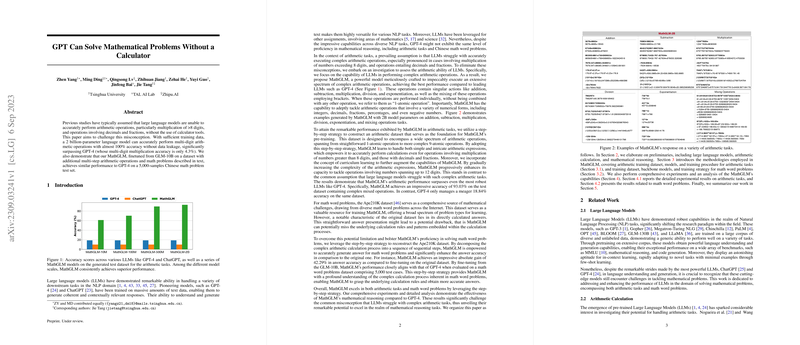Overview of "GPT Can Solve Mathematical Problems Without a Calculator"
The paper "GPT Can Solve Mathematical Problems Without a Calculator" challenges preconceived notions about the limitations of LLMs in performing arithmetic operations. It introduces MathGLM, a specialized approach that enhances the capabilities of LLMs in mathematical reasoning. The authors argue against the common belief that LLMs struggle with tasks such as multi-digit multiplication and operations involving decimals and fractions by demonstrating near-perfect accuracy for these tasks without external computational aids.
Key Findings and Contributions
The researchers developed a LLM with 2 billion parameters, achieving almost 100% accuracy in complex arithmetic operations. This stands in contrast to the relatively poor performance of models like GPT-4, which achieves only 4.3% accuracy in multi-digit multiplication. MathGLM is fine-tuned from GLM-10B using a sophisticated dataset that incorporates multi-step arithmetic problems written in text form. These fine-tuning processes allow MathGLM to reach a performance level comparable to GPT-4 on a comprehensive test set of Chinese math problems.
The paper's main contributions include:
- High Precision in Arithmetic Tasks: The MathGLM model excels in complex arithmetic operations, achieving superior performance compared to leading LLMs. The operations encompass addition, subtraction, multiplication, division, exponentiation, and combinations thereof, with the model adeptly handling integers, decimals, fractions, percentages, and negative numbers.
- Innovative Data Strategy: A key component of MathGLM's training is a carefully constructed dataset that spans from simple single-step tasks to intricate multi-step operations, allowing the model to learn and generalize arithmetic operations effectively.
- Curating a Curriculum: The training employs curriculum learning, gradually exposing the model to increasingly complex arithmetic tasks. This method echoes how humans learn mathematics and enables the model to handle arithmetic operations with numbers up to 12 digits, significantly surpassing the capabilities of traditional LLMs.
Methodology
This paper presents a novel pre-training objective using a diverse arithmetic dataset tailored for multi-step arithmetic tasks. Additionally, the research incorporates a step-by-step strategy to reinforce the model's understanding of complex mathematical calculations. The authors leverage curriculum learning to gradually increase the difficulty of tasks during training, ensuring the MathGLM’s capability to perform more complex calculations over time.
Further, the authors tested MathGLM against established datasets such as BIG-bench and a newly created test set with 9,592 arithmetic tasks. The MathGLM consistently outperformed existing models on these benchmarks, demonstrating the effectiveness of the proposed methodologies.
Implications and Future Directions
The findings significantly challenge the misconception that LLMs are inherently incapable of performing complex arithmetic operations without external calculators. This research suggests potential applications in domains requiring high-fidelity arithmetic capabilities, such as automated tutoring systems and advanced scientific computations.
The theoretical implications extend to developing more nuanced LLMs capable of excelling in both arithmetic tasks and broader mathematical reasoning challenges. The paper sets the stage for future research that could explore integrating similar strategies into other complex domain-specific tasks, refining the generalization abilities of LLMs.
Future directions could involve:
- Expanding Model Size and Training Data: Further enlarging model parameters and dataset size may enhance arithmetic capabilities under even broader scenarios.
- Exploring Multilingual Capabilities: Given the demonstrated performance LLMs have shown in multilingual NLP tasks, it would be valuable to assess MathGLM’s adaptability across different linguistic datasets.
- Integrating with Real-World Applications: Implementing MathGLM in practical applications may further validate its efficiency and highlight areas for improvement in handling real-world data beyond controlled experimental settings.
In conclusion, this paper presents a significant advancement in the area of LLMs applied to mathematical reasoning, offering an effective approach to overcoming previous performance bottlenecks concerning complex arithmetic operations.
